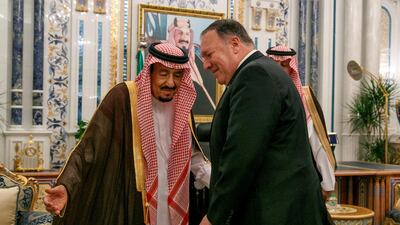Saudi Arabia's King Salman has approved the stationing of American troops in the country in order to boost security in the region and ensure stability in the Gulf, the Saudi Press Agency reported on Friday.
The US Defence Department confirmed the new deployment in a statement.
It said that troops and resources would be sent to Saudi Arabia in order to "provide an additional deterrent" in light of "emergent, credible threats".
The gesture comes amid rising tensions between Washington and Tehran in the Gulf that have impacted global oil markets.
The US and Saudi Arabia have a strong relationship, one built on trade and security affairs. US President Donald Trump made Riyadh his first port of call for a foreign state visit, holding a summit on counter-terrorism.
On Friday, Iran said it had seized a British oil tanker in the Strait of Hormuz, but denied Washington's assertion that the US Navy had downed an Iranian drone nearby earlier this week.
The decision on hosting US forces aims "to increase joint cooperation in defence of regional security and stability and to preserve its peace" SPA said, quoting a Ministry of Defence official, without giving further details.
A US official, speaking on condition of anonymity, said the deployment would include about 500 US military personnel in Saudi Arabia, and is part of a boost in the number of US troops in the Middle East that the Pentagon announced last month.
In June, the Pentagon said it would deploy 1,000 troops to the Middle East but did not say where they were going.
Relations between Washington and Tehran worsened last year when President Donald Trump abandoned a 2015 nuclear deal between world powers and Iran.
Under the pact, Iran agreed to restrict nuclear work, long seen by the West as a cover for developing nuclear weapons, in return for lifting sanctions. But sanctions have since been reimposed, badly hurting Iran's economy.
Trump has said he considers Saudi Arabia an important partner in the Middle East and counterweight to the influence of Iran.
Putting US combat forces back in Saudi Arabia, after an absence of more than a decade, adds depth to the regional alignment of US military power, which is mostly in locations on the Arabian Gulf that are more vulnerable to Iranian missile attack.
Starting with the January 1991 air war against Iraq after its invasion of Kuwait the previous summer, the US flew a wide range of aircraft from Prince Sultan air base, originally known as al-Kharj. Supported by an all-American array of creature comforts like fast-food restaurants and swimming pools, US forces there flew and maintained Air Force fighters and other warplanes.
The base also served as a launch pad for the December 1998 bombing of Iraq, code-named Operation Desert Fox, which targeted sites believed to be associated with Iraq's nuclear and missile programs. In 2001, the base became home to the US military's main air control organisation, known as the Combined Air Operations Center, which orchestrated the air war in Afghanistan until it was relocated in 2003 to Al Udeid air base in Qatar.

